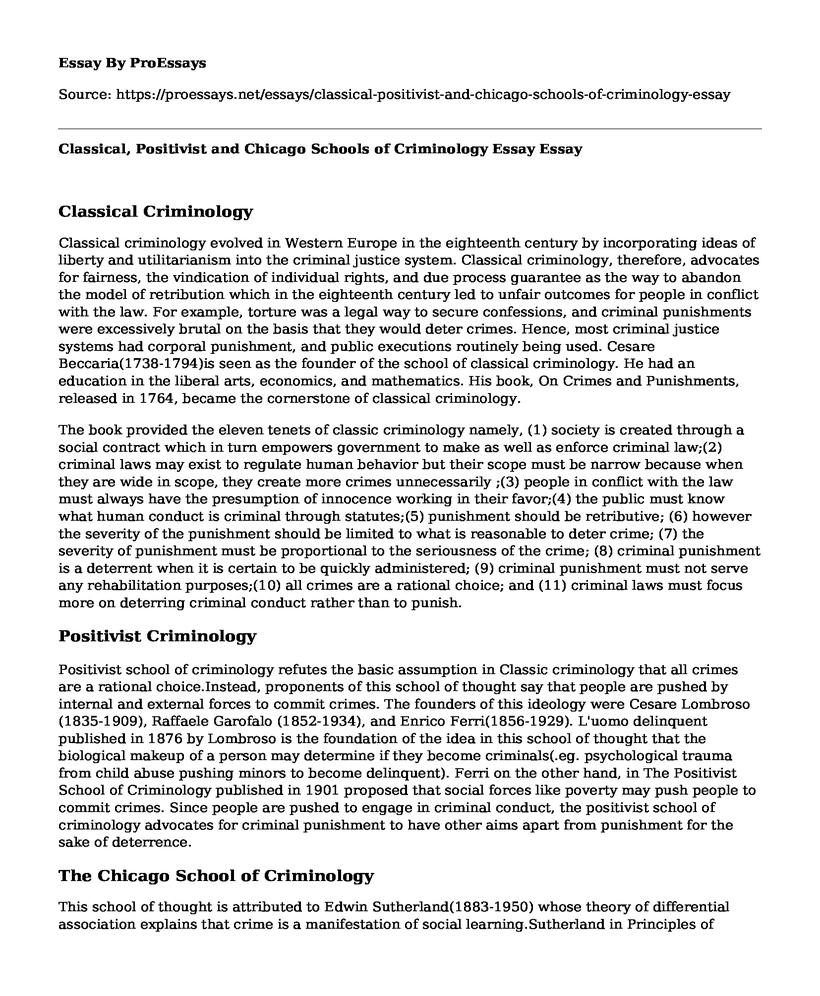Classical Criminology
Classical criminology evolved in Western Europe in the eighteenth century by incorporating ideas of liberty and utilitarianism into the criminal justice system. Classical criminology, therefore, advocates for fairness, the vindication of individual rights, and due process guarantee as the way to abandon the model of retribution which in the eighteenth century led to unfair outcomes for people in conflict with the law. For example, torture was a legal way to secure confessions, and criminal punishments were excessively brutal on the basis that they would deter crimes. Hence, most criminal justice systems had corporal punishment, and public executions routinely being used. Cesare Beccaria(1738-1794)is seen as the founder of the school of classical criminology. He had an education in the liberal arts, economics, and mathematics. His book, On Crimes and Punishments, released in 1764, became the cornerstone of classical criminology.The book provided the eleven tenets of classic criminology namely, (1) society is created through a social contract which in turn empowers government to make as well as enforce criminal law;(2) criminal laws may exist to regulate human behavior but their scope must be narrow because when they are wide in scope, they create more crimes unnecessarily ;(3) people in conflict with the law must always have the presumption of innocence working in their favor;(4) the public must know what human conduct is criminal through statutes;(5) punishment should be retributive; (6) however the severity of the punishment should be limited to what is reasonable to deter crime; (7) the severity of punishment must be proportional to the seriousness of the crime; (8) criminal punishment is a deterrent when it is certain to be quickly administered; (9) criminal punishment must not serve any rehabilitation purposes;(10) all crimes are a rational choice; and (11) criminal laws must focus more on deterring criminal conduct rather than to punish.
Positivist Criminology
Positivist school of criminology refutes the basic assumption in Classic criminology that all crimes are a rational choice.Instead, proponents of this school of thought say that people are pushed by internal and external forces to commit crimes. The founders of this ideology were Cesare Lombroso (1835-1909), Raffaele Garofalo (1852-1934), and Enrico Ferri(1856-1929). L'uomo delinquent published in 1876 by Lombroso is the foundation of the idea in this school of thought that the biological makeup of a person may determine if they become criminals(.eg. psychological trauma from child abuse pushing minors to become delinquent). Ferri on the other hand, in The Positivist School of Criminology published in 1901 proposed that social forces like poverty may push people to commit crimes. Since people are pushed to engage in criminal conduct, the positivist school of criminology advocates for criminal punishment to have other aims apart from punishment for the sake of deterrence.
The Chicago School of Criminology
This school of thought is attributed to Edwin Sutherland(1883-1950) whose theory of differential association explains that crime is a manifestation of social learning.Sutherland in Principles of Criminology published in 1924 proposed that criminal behavior is learned through peer-to-peer interactions in a given society. Sutherland proposed that criminal behavior is a type of social communication in a group of people(.eg. in neighborhoods, schools, gangs.etc). Individuals are therefore induced to engage in crime when they get the social messages that breaking the law is a positive thing. Just like the positivist school, it encourages criminal justice systems to have other aims other than pure retribution.SummaryConclusion
Classical criminology is different from positive criminology because the former does not accommodate rehabilitation as the aim of criminal justice. Having a system that is based purely on the ideas of Beccaria would lead to prison overpopulation that is an unnecessary tax burden on citizens. The Chicago school of criminology does the best job of explaining adolescent delinquency. Existing literature shows that children born to poor neighborhoods where criminality is rampant are more likely to in trouble with the law because they are socialized to believe that doing so is normal.
Bibliography
Lilly, J. Robert, Francis T. Cullen, and Richard A. Ball. Criminological theory: Context and consequences. Sage publications. (2018)
Sampson, Robert J., Stephen W. Raudenbush, and Felton Earls. Neighborhoods and Violent Crime. Community Health Equity: A Chicago Reader. (2019).
Valasik, Mathew. Classical Criminology. (2014). Accessed 03 March 2019 https://s3.amazonaws.com/academia.edu.documents/47030995/2014_Valasik.pdf
Cite this page
Classical, Positivist and Chicago Schools of Criminology Essay. (2022, Feb 17). Retrieved from https://proessays.net/essays/classical-positivist-and-chicago-schools-of-criminology-essay
If you are the original author of this essay and no longer wish to have it published on the ProEssays website, please click below to request its removal:
- Analysis of Cases
- Advocates for Child Abuse Victims Essay Example
- Intellectual Property: Case Study
- Essay Example on Fighting Crime: Analysing US Federal Structure's 6 Models
- Essay on Prisoners vs Students: Who Gets Free Food?
- Essay Example on Forensics: A Scientific Discipline for Criminal Activity Examinations
- Paper Example on Anderson et al. v Cryovac: The Woburn Case and Its Impact







